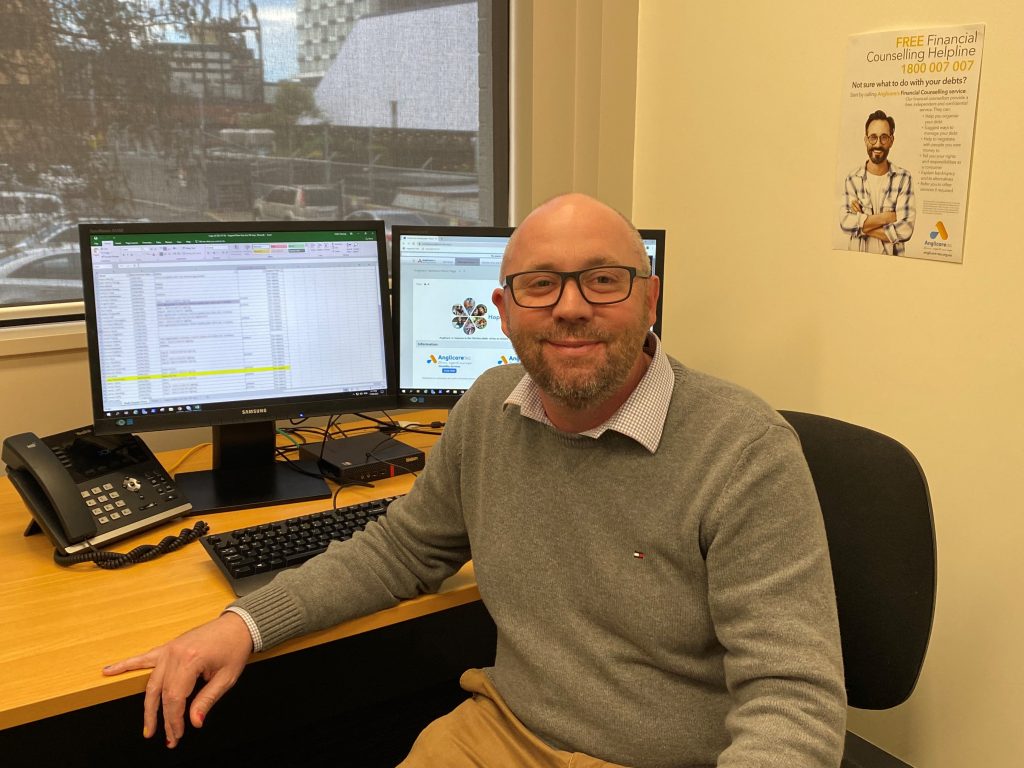Balance your budget for free, with Anglicare
September 29, 2022
Anglicare operates the National Debt Helpline in Tasmania. It’s a free service for Tasmanians, operated by Tasmanians.
Mat O’Brien is the southern program manager for financial counselling at Anglicare.
“You don’t have to be in financial crisis to ring the Helpline,” Mat says. “You don’t need to have accumulated any debts, despite the name of the service! We all know that the cost of living has risen. You might need some simple hints and tips on how to balance your budget and make your income go further. We’re here to support you whatever your situation.”
Mat said the earlier you reach out, the better.
“Our conversation will be about much more than numbers,” he said. “We will challenge you and motivate you. We will explain the consequences of the choices you are making about money. If you are in debt we can assist you to negotiate an affordable repayment plan. And in some cases we can arrange for a debt waiver.”
Mat encourages people to accept and admit that they can’t afford everything they would like to have: “There’s so much pressure for people to think that spending money is good and makes you and others happy. This can have a negative impact on both your mental and physical health.
“A financial counsellor can coach you on how to have conversations about money and commitments with others in your family, including children,” said Mat.
The Anglicare team is particularly concerned about the take-up of Buy Now Pay Later programs, such as AfterPay and similar products.
“These products are very easy to obtain. If you use them without a budget to work with, you will run into problems,” said Mat. “We explain the hidden fees and charges. If you miss a payment or pay late, you can be hit with a fee that can be as big as $15. Then there are fixed monthly fees, a payment processing fee and some providers also charge an establishment fee. It may become difficult to get approval for a loan to buy a car or a house in the years ahead if you have this kind of debt. Even late payments will affect your credit rating.
We show people where their money is going. We explain how working more to earn more to cover the cost of material things is not the answer. We talk to people about what it will feel like to achieve a long term financial goal.
Tips for younger people
The Anglicare team offers these tips for younger people who live on a limited income.
- Reach out to NILS, the No-Interest Loans Scheme for items related to your education, such as a laptop – or to pay for things like car repairs, a sofa or a new fridge. You can also use a NILS loan to cover medical and dental expenses.
- Be aware of how little things, such as your morning caffeine fix and subscriptions to gaming and streaming services, can quickly add up.
- Shop around for your service providers. Look for a bank that offers no fee/low fee accounts and a ‘no-frills’ phone/internet company.
- Make sure you include everything in your budget, including a provision for special splurge items or experiences.
Lewis’s story
Lewis* signed up for the BeforePay app. This gave him early access to his fortnightly salary, for a flat fee according to the amount that he borrowed. He spent the money and was then ‘short’ well before his next pay day.
“In the beginning I was borrowing very small amounts, like $50,” he recalled. “Then the company increased my borrowing capacity so that I could borrow 25% of my pay in advance. And the fees went up. I thought it was a great idea at the time, even though I was already under financial stress. I felt like I was on a hamster wheel and I couldn’t get off.”
Financial counselling supported Lewis to make changes to his spending patterns and live within his means.
Ruby’s story
Ruby* called the National Debt Helpline because her debts had become unmanageable. The constant phone calls she was getting from creditors were making her anxious. She cried throughout the call. When asked about her debts, she said they were “all the bad ones”.
The Anglicare financial counsellor arranged to meet Ruby in person to make a plan. It became clear that most of Ruby’s debts were with Buy Now Pay Later creditors.
Ruby explained to her counsellor that she found these services easy to use when she was out shopping. She could take the item home straight away. She could split the costs into several payments. This made her think that her purchases were affordable.
Ruby opened five BNPL accounts and none of the providers checked with her to see if she could afford them. They offered her increases to her credit limits. When the repayments became too much, she took out some quick ‘payday’ loans to buy groceries for her family.
Ruby’s counsellor took her through her options and together they designed a repayment plan and a new budget.
*We have changed our clients’ names to protect their privacy.
Next steps
“What happens after you make that first call is up to you,” explains Mat O’Brien. “We can continue talking to you over the phone or we can arrange to meet you in person. We can continue the conversation for as long as you need it. The beauty of our service is that it is free, friendly and confidential.”
Financial counselling is about budgeting and goal-setting. It doesn’t cover investments or growing your wealth. Your financial counsellor will tell you if they think you need legal advice.

